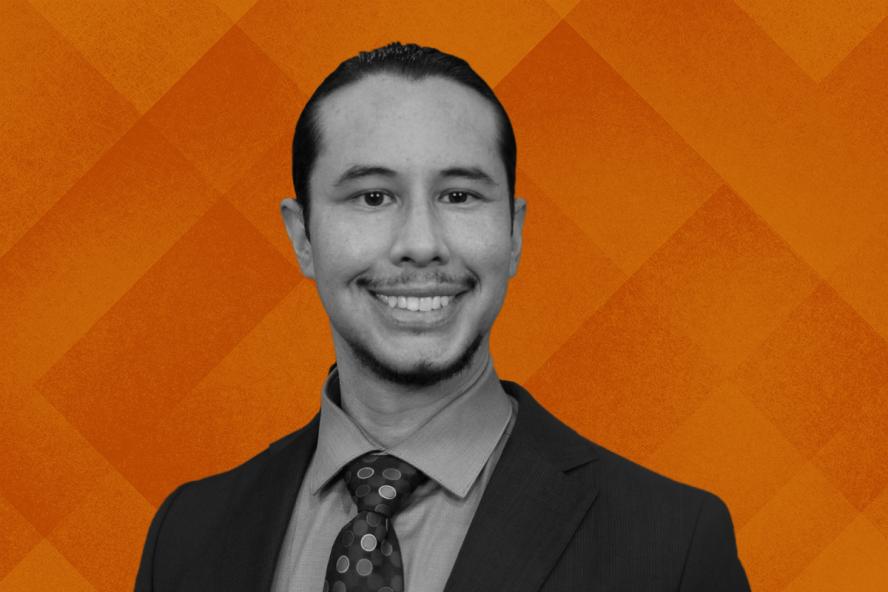-
About
- Departments & Offices
-
Academics
- Public Health
- Biomedical Sciences
- Physician Assistant
- Special Master’s (MBS)
-
Admissions & Financial Aid
- Tuition & Fees
-
Student Experience
-
- Student Resources by Program
- Academic & Student Support
- Wellness & Wellbeing
- Student Life
- Events & Traditions
-
-
Research
- Research Labs & Centers
- Tufts University-Tufts Medicine Research Enterprise
-
Local & Global Engagement
- Global Health Programs
- Community Engagement
James Edward Patino, MPH24
“Through a lens of social justice and cultural humility, I am committed to using my personal and professional experiences to advocate for policies and interventions that prioritize equitable access to healthcare, especially for minoritized communities.”

How have your experiences at Tufts prepared you for your future career?
First and foremost, the mentorship and support I received from the inspiring Tufts faculty and staff has been invaluable to my professional growth. I have gained lifelong mentors and opportunities to network and collaborate with leaders across the country. The Public Health Program and its dynamic curriculum have equipped me with multi-domain skill sets including the application of epidemiology, biostatistics, and program leadership and development that will help me identify public health issues through an equity lens to mitigate negative social determinants of health.
Can you share a memorable moment or experience from your time at Tufts that has left a lasting impression on you?
The amazing Tufts faculty has had a tremendous impact on my journey. Meeting and connecting with Si Pearman, Kim Dong, Linda Hudson, and Shayesteh Jahanfar at consecutive annual APHA conferences—Boston and Atlanta—are special memories. Remembering these inspiring encounters reminds me of the impact of community. They inspired me to pursue my passion for Type 2 Diabetes research and, with their support, I was able to secure an opportunity to work on an innovative research project at the Joslin Diabetes Center investigating the prescription and utilization of novel diabetes medications. Through their investment in my journey, Tufts faculty equipped me with more than just knowledge; they cultivated a spirit of service and collaboration, and affirmed my commitment to advocacy in public health and promoting equitable access to care.
If you could go back to before you started at Tufts and give yourself one piece of advice, what would it be and why?
As with any new endeavor, there is always some trepidation and fear of the unknown. Now that I am at the end of my training at Tufts, I’d advise myself not to worry so much as there are wonderful people and communities to help boost and support your trajectory in the program. The proverb, “it takes a village to raise a child” feels particularly applicable, as my Tufts village made this journey a successful one. I am confident that the training and education I received at Tufts equipped me for the journey towards my mission-driven goal of promoting health equity.
What are your aspirations and goals beyond graduation, both personally and professionally?
As I look to the future, I am reaffirmed in my commitment to leverage my training in medicine and public health to drive meaningful change in healthcare delivery and health outcomes. I am especially passionate about equity-minded interventions to address chronic diseases— particularly Type 2 Diabetes—in underserved communities. This is both a personal and professional mission-driven endeavor given my experiences as a person of color with many family and community members suffering and dying from preventable chronic diseases due to health disparities. The intersection of social determinants of health, biological risk factors, and health inequities is of particular interest given the multifactorial causes of poor health outcomes for those disenfranchised from our healthcare system. Through a lens of social justice and cultural humility, I am committed to using my personal and professional experiences to advocate for policies and interventions that prioritize equitable access to healthcare, especially for minoritized communities.
How have your research interests evolved throughout your time in the MPH program, and what impact do you hope your research will have on your field?
My capstone research project was through the Joslin Diabetes Center and focused on racial disparities in diabetes intervention. This experience has broadened my scope of research practice to integrate data analytics and mixed methods in the quantification of impact on health outcomes, creating a new foundation for my research development moving forward.
How has your experience in the MPH program shaped your understanding of public health issues, and how do you envision applying this knowledge to address current and future challenges in public health?
My training in the MPH program provided me with the ability to critically examine and address complex public health problems that impact communities with an equity-informed focus. My concentration in biostatistics and epidemiology has provided me with essential skills and uncovered an area of specialty for my future career.
How has the MPH program prepared you to collaborate effectively with diverse stakeholders and communities to address public health disparities and promote health equity?
Through my work at Tufts, I learned to build coalitions with multidisciplinary stakeholders and community members to work towards a shared goal and mission to advance public health initiatives.